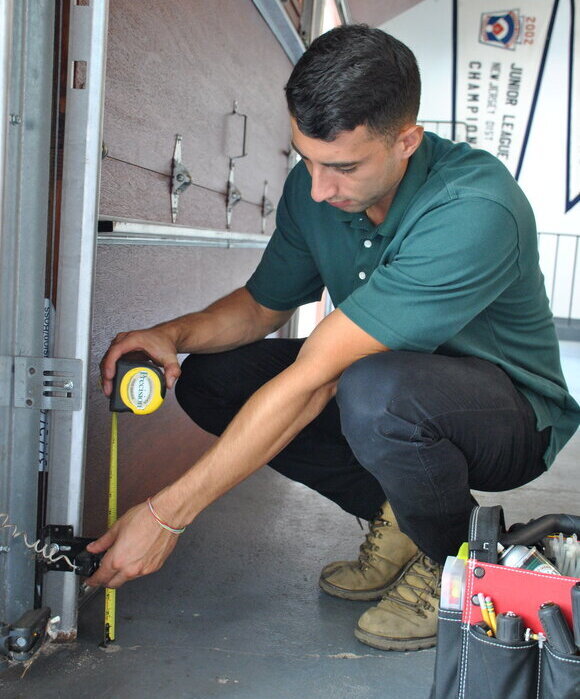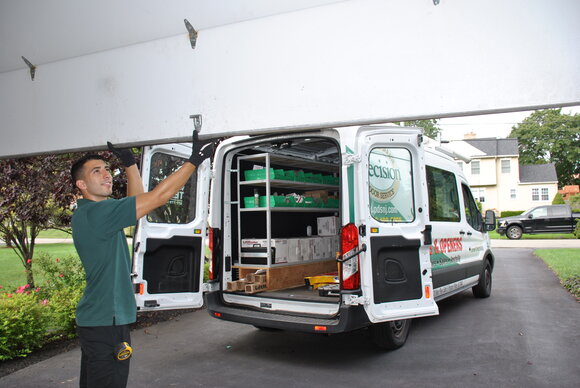Selling Your Home? How to Pass Your Garage Home Inspection





WITH 1,786 REVIEWS
Click Here To Book Online Now





CLICK
To view local phone numbers

Selling your home can be an exciting and exhausting process. The thought of a new adventure makes moving fun! However, packing everyone and everything up feels never-ending, not to mention the calls to the realtor, moving company, and home inspector! (You didn’t forget to call the home inspector, did you?!)
The home inspector’s responsibility is to make sure every part of your home is up to code, from the electrical work to the foundation. Yes, even the garage and garage door system. As the largest moving part of your home, your garage door must pass the inspection before the home inspector can sign off on the report. Several elements contribute to a successful garage door system inspection.
Safety Eyes
The safety eyes are mounted on the bottom of the track near the opening. They emit an invisible beam to one another. If the beam is broken by a person, pet, or object as the door is closing, the safety eyes send a signal to the opener to reverse and return to the open position to avoid injury. Since 1993, all garage door openers manufactured in the U.S. must include safety eyes. If your current garage door system doesn’t have safety eyes, you can’t just add them on as a solution. Without safety eyes you won’t pass inspection and it’s time for a new opener.
Garage door safety eyes should be installed 3”–6” from the ground. This height ensures that they can detect even the smallest of people, objects, or pets and alert the garage door to return to the open position.

Wall Control Panel
The wall control panel is located inside the garage near an entry door. Depending on the model of your garage door opener, it will have a light button, an open/close button, and a screen that allows you to set features and functions to meet your preferences. The wall control panel should be mounted no lower than 5’ from the floor, out of the reach of children who may see the wall control panel as an opportunity for fun, when in fact, the garage door can be hazardous.
Safety Reversal
Garage doors are designed to reverse if they are met with an obstruction while closing. Safety reversal is a safety feature that is built into the garage door opener. To test this feature, the inspector may lay a 2x4 piece of wood in the garage door opening and prompt the door to close. Once the garage door touches the piece of wood, it should immediately reverse back to the open position. Failure to do so will result in a failed garage door inspection.

Garage Door Balance
Springs carry the door’s weight, and if they are very worn or an incorrect size, it can lead to a door that is difficult to open or may slam shut. An improperly balanced garage door shortens the garage door opener’s life because it has to do more work to open and close the garage door. A test of the garage door balance can help ensure your garage door is running correctly and indicate what’s left of the existing springs and if a replacement is necessary.
The inspector will check the garage door balance by disengaging the trolley, which will allow the door to move manually. A properly balanced door shouldn’t feel heavier than 5-10 lbs as it’s lifted in 3 positions: 1/4 of the way up, 1/2 way, and 2/3 of the way up and should sit in each of these positions without any support.
Grounded Outlet
Any reputable garage door company will not allow you to plug your opener into an extension cord because it is a fire risk. Permanent appliances in your home, such as a dishwasher or refrigerator must be plugged directly into an outlet in order to pass code. A garage door opener is no different. If your opener is plugged into an extension cord, it will not pass inspection. You will need to call an electrician and get an outlet installed closer to the opener to be plugged right in.
Safety Cables
Safety cables are only found in a garage with an extension spring system. Safety cables run through the extension spring, which raises and lowers your door. The cables are a safety barrier between the extension spring and anything or anyone near it if it breaks. The cables keep the springs contained and help protect any people, pets, or objects that could be in its path. If you don’t have safety cables on your extension springs, you won’t pass an inspection.
Bottom Rubber and Weather Seal
Bottom rubber attaches to the bottom of your garage door to help stop air, dirt, bugs, and pests from entering the garage. The weather seal is the vinyl flap placed around the outside frame of a garage door. These elements of a garage door are vital because they help eliminate air infiltration around the garage door. Preventing heat loss can ultimately help with energy bills for heating and cooling your home and make sure the R-value of your garage door is effective.
The inspector will check to guarantee that these elements are on your door and check the condition to ensure that the weather seal and bottom rubber are doing their job.

Overall Condition of the Garage Door
The condition of the door and all of its parts are important in a home sale. You’ll want to ensure your door is working correctly, which can eliminate safety and security issues. Additional inspection of the look of the door will reveal any dents, rips, or tears in the material or any broken windows. The inspector will also look for any areas of the garage door that may have rotted or rusted over time and may cause a hazard that should be addressed.
Knowing what to expect helps you prep your garage for a complete garage door inspection that will go well, thus freeing up time to pack, organize, and pack some more! A satisfactory garage door inspection can help make your home's selling process smoother and eliminate the need to push a closing date back or have possible buyers scared off because of issues.
Categories:
Preventative MaintenanceOffice: (408) 533-1120
2007 W Hedding Street
Suite 203
San Jose, CA 95128
Licenses
Contractor License#979078
If you are looking for service in the San Francisco area, please visit:
precisiondoorsanfrancisco.com/
If you are looking for service in the East Bay area, please visit:
precisiondooreastbay.com/














